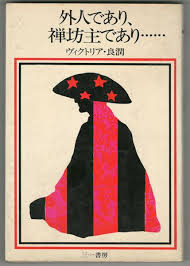ZEN MESTEREK ZEN MASTERS
« Zen főoldal
« vissza a Terebess Online nyitólapjára

Brian A. Victoria / Brian Daizen Victoria (1939-)
Brian Andre Victoria / Dharma name: 良潤 Ryōjun / Pen name: 大禅 Daizen*
"I adopted the "pen name" of Daizen (大禅) completely on my own volition and am in the midst of slowly fazing this name out due to the confusion it has created."
(a letter from Brian Victoria to Gábor Terebess, January 21, 2024)
Brian Ryōjun (aka Daizen) Victoria holds an M.A. in Buddhist studies from the
Sōtō Zen sect–affiliated Komazawa University in Tokyo and a Ph.D. from the Department
of Religious Studies at Temple University. He also holds a first-degree black
belt in the martial art of aikidō.
Brian first came to Japan in 1961 in order to perform his “alternate service duty”
as a conscientious objector, promoting international friendship and understanding
by teaching English at Aoyama Gakuin University in Tokyo. It was during this period
that Brian began his Zen training as a layman at the the Sōtō Zen monastery
of Eiheiji in Fukui prefecture. He then formally entered the Sōtō Zen priesthood in
1964 as a disciple of the Venerable Tatsugami Ryōsen, abbot of 霊泉寺 Reisenji
Temple in Fukui prefecture and longtime Inō (cantor/discipline master) at Eiheiji.
Following monastic training at Eiheiji, Brian pursued graduate studies in Buddhism
at Komazawa University from 1968, during which time he became a disciple
of Sōtō Zen scholar-priest 横井覚道 Yokoi Kakudō (1922-1974). Following Yokoi’s
untimely death from cancer, Brian received Dharma transmission from the
Venerable Asada Daisen, abbot of Jōkuin Temple in Saitama prefecture, in 1975.
Brian’s ordained name is 良潤 Ryōjun (Penetrating Goodness). His pen name is 大禅
Daizen (Great Meditation).
In addition to Zen War Stories (2003), Brian’s writings include Zen at War (2nd
ed., 2006);

an autobiographical work in Japanese titled 外人であり、禅坊主であり
Gaijin de ari, Zen bozu de ari (As a Foreigner, as a Zen Priest) (1971);
Zen Master Dōgen, coauthored with Prof. 横井雄峯 Yokoi Yūhō of Aichi-gakuin
University (1976); and a translation of The Zen Life by Sato Koji (1972).
In the past, legal and nonviolent opposition to U.S. involvement in the Vietnam
War, coupled with support for political prisoners throughout Asia, led to Brian’s
deportation from the Republic of China on Taiwan, the People’s Republic of China,
South Korea, the former Republic of South Vietnam (on two occasions), and eventual
imprisonment and visa cancellation in Japan.
At present, Brian is a senior research fellow of the Oxford Centre for Buddhist
Studies, a recognized independent center of the University of Oxford. He is also a
special lecturer at the Sōtō Zen–affiliated Hōkyōji Temple in Fukui prefecture, Japan.
He is not affiliated with any Zen group in the West.
https://en.wikipedia.org/wiki/Brian_Victoria
http://apjjf.org/-Brian-Victoria
https://ocbs.academia.edu/BrianVictoria/CurriculumVitae

http://www.writersinkyoto.com/2016/03/brian-victoria-on-zen-terrorism/
PDF: Zen and Japanese Militarism: A Critical Inquiry Into the Roots of 'Imperial Way-Zen'
Dissertation, Temple University, 1996
PDF: Zen at War
by Brian Daizen Victoria.
http://en.wikipedia.org/wiki/Zen_at_War
http://www.japanfocus.org/-Brian-Victoria
http://www.japanfocus.org/-Brian-Victoria/3973http://sweepingzen.com/an-article-concerning-d-t-suzuki-and-the-nazis/
http://sweepingzen.com/zen-war-author-brian-victorias-unethical-bahavior-jundo-cohen/http://www.thezensite.com/ZenEssays/CriticalZen/Question_of_Scholarship.pdf
http://buddhism.about.com/b/2010/05/19/zen-at-war-maybe-not-so-much.htm
http://kyotojournal.org/the-journal/conversations/zen-at-war-2/Yasutani Roshi: The Hardest Koan
Brian Victoria uncovers the wartime anti-Semitism of one of America’s most seminal Zen masters.
Responses to this material from: Robert Aitken, Bernie Glassman, Bodhin Kjolhede, and Lawrence Shainberg
Tricycle, Fall 1999
https://tricycle.org/magazine/yasutani-roshi-hardest-koan/
PDF: Zen War Stories
by Brian Daizen Victoria
PDF: Zen Terror in Prewar Japan: Portrait of an Assassin
by Brian Daizen Victoria
Rowman & Littlefield Publishers, 2019
https://www.amazon.com/Zen-Terror-Prewar-Japan-Portrait/dp/1538131668
PDF: Foreword by James Mark Shields
PDF: The Rehabilitation of a Japanese Buddhist Heretic Uchiyama Gudō (1874–1911), JOCBS 22: 46–82 ©2022
Brian Daizen Victoria
at http://www.thezensite.com/MainPages/critical_zen.htmlBrian Daizen Victoria is an academic, historian, educator, author and a priest in the Soto lineage. He has written three influential books, Zen War Stories, Zen at War and Zen Terror in Prewar Japan: Portrait of an Assassin as well as numerous articles dealing with Zen Buddhism and its approach to war and violence. Some of his articles are collected here.
book reviews of Victoria's Zen at War another review by Baran, Josh. Zen Holy War? 1998
book review of Victorias' Zen War Stories
book review of Victoria's Zen Terror in Prewar JapanIs It Possible for an Entire Sangha to be ‘Defeated’ in the Holy Life? Victoria questions whether Japanese Buddhist 'peace exhibitions' are promoting an end to war or are they just seeing Japan as a victim of war, ignoring the sangha's complicity in supporting military aggression. from: Journal of the Oxford Centre for Buddhist Studies, 2020(19): 103–124
Abolish Buddhism and Destroy Shakyamuni! Victoria has written extensively on Japanese Buddhism's support for state-sponsored violence. This essay traces how and why this support arose. source: Journal of the Oxford Centre for Buddhist Studies 2019 (17), pp 120-151
Buddhism and Violence: This is a short introductory essay on some of the ways Buddhist writings have been used to justify extreme violence. A good beginning to understand Victoria's work in this field.
source: EngageCounting-the-Cost-of-Buddhist-Syncretism: Victoria looks at how Zen's tolerance of other religions has changed Zen Buddhism, especially in the context of Japanese Zen and its intimate relationship with the Japanese animistic faith of Shinto. from Journal of the Oxford Centre for Buddhist Studies, 2018 (15) 55-77
Zen Terror: Victoria looks at the convicted assassin Nissho Inoue (April 12, 1887 – March 2, 1967) and how he used Zen Buddhism to justify assassinations in Japan in the early 1930's. This is based on his latest book, Zen Terror in Prewar Japan: Portrait of an Assassin(2019).
The Emperor's New Clothes: The Buddhist Military Chaplaincy in Imperial Japan and Contemporary America Victoria looks at how the Buddha Dharma is interpreted to allow Buddhist chaplains to engage on the battlefield in both Japan and contemporary American armed forces.
Engaged Buddhism: a Skeleton in the Closet?Victoria continues his probing of Japanese Buddhist masters during WWII, pointing out that some "heros of the faith" were not what they seemed. Specifically, Victoria looks at the Venerable Nichidatsu Fujii, Soka Gakkai founder Tsunesabur‘ Makiguchi and Zen master Haku'un Yasutani.
from Journal of Global Buddhism, Vol 2, 2001Karma, War and Inequality in Twentieth Century Japan Brian Victoria looks at the socio-political role of the belief in karma played in Japan. He examines how karma was used to justify war and social oppression in Japan. from Asia-Pacific Journal: Japan Focus 2007
Kemmyō Taira Satō: D. T. Suzuki and the Question of War; Translated in Collaboration with Thomas Kirchner Brian Victoria's Zen at War (see book reviews here and essay here) created quite a stir in Western Zen circles. One of the criticisms by Kemmyō Satō of Victoria's book is that Satō accuses Victoria of claiming that D. T. Suzuki was a supporter of the Japanese military during WWII. Satō has taken another look at Victoria's sources and comes to quite a different conclusion. This is an important rebuttle of Victoria's accusations about Suzuki. Well worth reading. from The Eastern Buddhist 39/1: 61–120 Also, Gary Snyder and Nelson Foster have written about this in Tricycle.
Brian Victoria replies to his critics who claim he has unfairly catagorized D. T. Suzuki as supporting Japanese militarism: The "Negative Side" of D. T. Suzuki's Relationship to War from: The Eastern Buddhist 41/2: 97–138
Sato offers a rebuttal to Victoria's above article: Brian Victoria and the Question of Scholarship from: The Eastern Buddhist 41/2: 139–166
Brian Victoria continues exploring D. T. Suzuki's wartime writings with Zen as a Cult of Death in the Wartime Writings of D.T. Suzuki from The Asia-Pacific Journal, Vol. 11, Issue 30, No. 4, August 5, 2013.
D.T. Suzuki, Zen and the Nazis: This is Part I of a three-part series on Suzuki's relationship with the German Nazis. from The Asia-Pacific Journal, Vol. 11, Issue 43, No. 4, October 28, 2013
Part II of this series on Suzuki is A Zen Nazi in Wartime Japan: The Formation and Principles of Count Dürckheim’s Worldview and his interpretation of Japanese Spirit and Zen by Karl Baier Baier explains the "spiritual" aspect of Nazism and its relationship to the Japanese spiritual worldview. A very interesting article that helps explain some of the thinking behind the Nazis. from The Asia-Pacific Journal, Vol. 11, Issue 48, No. 3, December 2, 2013
Part III of the series is A Zen Nazi in Wartime Japan: Count Dürckheim and his Sources—D.T. Suzuki, Yasutani Haku’un and Eugen Herrigel Victoria rounds up the Nazis and discusses Suzuki's relationship with some, especially Count Durckheim, who spent most of the war in Japan. This is the final of the series. from The Asia-Pacific Journal, Vol. 12, Issue 3, No. 2, January 20, 2013
Japanese Buddhism in the Third Reich: Brian Victoria looks at the Nazi fascination with Zen Buddhism and introduces some of the main players. from Journal of the Oxford Centre for Buddhist Studies, 2014, Vol 7
The Zen of Hitler Jugend: Brian looks at the extraordinary visit of a delegation of Hitler Youth (Hitler Jugend) to the head temple of the Soto sect, Daihonzan Eiheiji, for an overnight stay. The article includes photos and a translation of an article on the visit in the temple's periodical, Sansho. from The Asia-Pacific Journal, Vol. 14, Issue 2, No. 2, January 18, 2015.Victoria looks at Sawaki Kōdō Roshi and his attitude towards war in the first of a two-part series Zen Masters On the Battefield. from The Asia-Pacific Journal, Vol. 11, Issue 24, No. 3, June 16, 2014.
Sawaki Kōdō, Zen and Wartime Japan: Final Pieces of the Puzzle This is the second part of the above essay. from The Asia-Pacific Journal, Vol. 13, Issue. 17, No. 2, May 04, 2015
In Part Two of Zen Masters on the Battlefield, Brian Victoria looks at the wartime record of Zen Master Nakajima Genjō (1915-2000)
Violence-Enabling Mechanisms in Buddhism; Victoria looks at how some religious doctrines can be turned around to justify violence. from Journal of the Oxford Centre for Buddhist Studies
Sōka Gakkai Founder, Makiguchi Tsunesaburō, A Man of Peace? Brian Victoria looks at the war-time record of Makiguchi Tsunesaburō, founder of the Nichiren sect-affiliated, lay Buddhist organization today known as Sōka Gakkai. from The Asia-Pacific Journal, Vol. 12, Issue 37, No. 3, September 15, 2014
The Buddha Dharma in Japan 70 Years On (Part I) and Part II Brian Victoria in Part I looks at the role of Soka Gakkai in the Asia-Pacific War and in Part II looks at Soto Zen Master Sawaki Kodo’s wartime record and how the Soto sect welcomed Hitler Jugend (Hitler Youth) to Daihonzan Eiheiji.
An Ethical Critique of Wartime Zen: "This article explores the ethical implications of those numerous Japanese Zen masters who so strongly and unconditionally supported Japanese aggression during the Asia-Pacific War (1937-45) and before." Victoria also questions whether "... the Zen school, at least during wartime, may have forfeited its right to be considered a legitimate part of Buddhism." original source: Journal of the Oxford Centre for Buddhist Studies, Vol. 9
Brian Victoria has engaged in a discussion of his work at the Sweeping Zen site. Below are some links to this discussion with comments from readers.
The “Non-Self” as a Killer
An Article Concerning “D. T. Suzuki and the Nazis”
D.T. Suzuki and the (Dis) Unity of Zen and the Sword
Brian Victoria’s War on Zen
The End of a (Zen) Buddhist Myth
Jundo Cohen has engaged Brian Victoria in a vigorous debate at Sweeping Zen. Here are some of his postings.
“Zen At War” Author Brian Victoria's War On ZeN – by Jundo Cohen
“Zen at War” Brian Victoria: Throwing Bombs at Kodo– by Jundo Cohen a longer version of this article is available here.A Buddhist View of War: A Buddhist View of War" by D. T. Suzuki. In this essay Suzuki seems to support the idea of 'holy war'. Written during the Russo-Japanese War (8 February 1904 – 5 September 1905), Suzuki promotes Zen Buddhism as a legitimate path to being a warrior. The essay was published in The Light of Dharma, July, 1904, Vol. 4. No. 2 pp. 179-182. The Light of Dharma was published in English from 1901 to 1907 by the Jōdo Shinshū sect in San Francisco.
A Buddhist View of War by Shaku Sōen: Sōen was D T Suzuki's Zen teacher and perhaps this is where Suzuki got his ideas of Buddhism and war. This brief excerpt comes from Sermons of a Buddhist Abbot, translated by D T Suzuki and published in 1906.